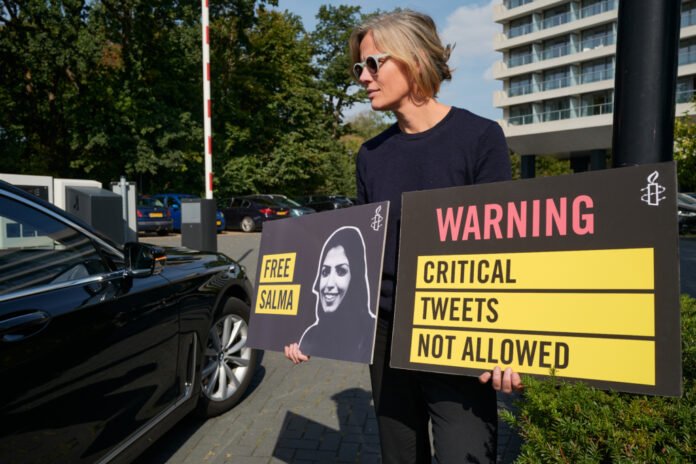Saudi Arabia’s authorities should immediately release anyone arbitrarily detained solely for expressing their views online ahead of the upcoming Internet Governance Forum (IGF) in Riyadh, 40 NGOs and human rights groups, including Amnesty International, say in a joint statement published today.
One of the main themes of the annual digital public policy forum, which will take place from December 15 to 19, 2024, is promoting human rights in the digital age. The organizations highlighted the hypocrisy in Saudi Arabia hosting the event as they continue to detain, forcibly disappear and intimidate people into silence.
“Saudi Arabia’s authorities still have 100 days before the IGF begins to demonstrate that they will ease their draconian suppression of freedom of expression, and to demonstrate that they will use this event as an opportunity to implement real reforms.” rather than as part of an image wash. campaign,” said Agnès Callamard, Secretary General of Amnesty International.
“To prove that organizing the conference on the future of the internet is more than just a cynical PR exercise, Saudi authorities must release all those arbitrarily detained solely for exercising their right to freedom of expression online before the IGF begins.”
To prove that organizing the conference on the future of the internet is more than just a cynical PR exercise, Saudi authorities must release all those arbitrarily detained solely for exercising their right to freedom of expression online before the IGF starts.
Agnès Callamard, Secretary General of Amnesty International
Many civil society activists and human rights defenders who usually attend the annual conference have expressed serious concerns about traveling to Saudi Arabia to participate, for fear of arrest, intimidation or surveillance, given Saudi Arabia’s record in the field of silencing and imprisoning critics.
Amnesty International calls on the IGF Organizing Committee to seek public assurances from the Saudi authorities that no one will be denied entry into the country to participate in the conference, that none of the IGF participants will face any form of harassment, including detention and surveillance, and that all participants can speak freely.
In recent years, Amnesty International has documented how Saudi authorities have waged a chilling crackdown on people who show even the slightest sign of dissenting or critical views online.
Among those condemned for their online statements is Salma al-Shehab. She was arrested in January 2021 and, after a highly unfair trial, sentenced in January 2023 to a shocking 27-year prison sentence, followed by a 27-year travel ban on trumped-up terrorism charges simply for tweeting in support of women’s rights .
In another deeply disturbing case, in January 2024, the Saudi terrorism court sentenced Manahel al-Otaibi to 11 years in prison in connection with
with social media posts promoting women’s rights and sharing photos of herself online in a mall without wearing an abaya (a traditional loose-fitting robe with long sleeves).
Targets also include Abdulrahman al-Sadhan, a Red Crescent worker who was sentenced to 20 years in April 2020, followed by a 20-year travel ban, after a highly unfair trial, for his satirical tweets, and Mohammad bin Nasser al-Ghamdi, a retired teacher, who was sentenced to death in July 2023 for criticizing authorities on X (formerly Twitter) and his online activities on YouTube.
“These cases illustrate the dark truth about the suppression of freedom of expression online by the Saudi authorities. If Saudi authorities are serious about taking a global leadership role in digital public policy, they must demonstrate their commitment to respecting the right to freedom of expression for all by reforming vague laws that criminalize expression, such as the Anti -Cyber Crime Law, and put a decisive end to their repressive crackdown on critics, both online and offline,” said Agnès Callamard.





